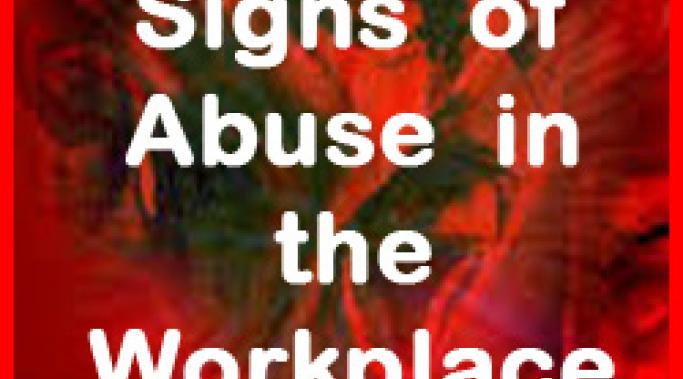At one job, my boss manipulated and controlled her employees. She tried to win over her employees by becoming overly familiar with us and then using the information to manipulate our actions, even play one employee off another. She obviously manipulated my supervisor, Dean, and after becoming his friend, I found she abused him in hidden ways, too. The signs of workplace abuse made it obvious I needed a new job (Dealing With Verbal Abuse At Work).
Signs and Symptoms of Abuse
I witnessed verbal and financial abuse at my first job after leaving my ex. When the abuser was not around, the shop was fun and I enjoyed working there. When the abuser was present, people acted differently and the atmosphere became oppressive. The air would lighten a little when she, the abuser, would enter the shop and appear happy, but darken the moment she stormed through the doors with a scowl. The shop doors were like a stage curtain opening - we really didn't know what to expect until the diva appeared in view.
Years ago in Al-Anon, I learned that it is almost impossible to be at my best if I am Hungry, Angry, Lonely, and/or Tired. I discovered that I could HALT myself, take a breather, and remedy any of those conditions before moving on with the day. For the most part, it is good advice. The troublesome aspect of being Angry with someone who believed I had no right to be angry plagued me.
He ignored my anger or met it with escalating anger of his own; there was no peaceful conflict resolution in my marriage. There was quite a bit of stuffing anger down deep inside because it did no good to express it to the one person who could help resolve it. There was also quite a bit of yelling and crying on my behalf, mostly directed at him but regretfully spilling out onto my children too.
I wrote you a story of leaving abuse because sometimes the words of verbal abuse weigh so heavily in our minds and hearts that we no longer hear the good words. Pummeled by negativity, our brains begin to tell us our story of abuse, and in creating it, focusing on the pain, we cannot hear anything else. I call this story of abuse The Foreigners because the kind voices this abused woman hears start as foreign, but become the only voices she wants to hear.
Lawyers use Battered Woman Syndrome (BWS) to explain a battered woman's behavior to a jury who does not understand why she "didn't just leave". After all, we all have the freedom to choose our own adventure in life, don't we? Why does an abused woman stay with a violent partner?
BWS is a subtype of Post-traumatic Stress Syndrome. This means, in part, that if you are abused, you may or may not show or feel all of the signs of PTSD, but you probably show other mentalities and behaviors in addition to many symptoms of PTSD. Most of the studies I've been reading compile data from women who are physically abused, but they also list verbal abuse as a precursor to physical violence - it's almost impossible to imagine that physical violence does NOT follow verbal abuse.
Walking away from verbal abuse temporarily helps ease the trauma of the abuse. Unfortunately, the abuser doesn't like it when you do not stand there and listen to the abusive rant, so walking away can seem like the absolutely worst option at the time of attack, yet walking away from verbal abuse is probably the best option, every time.
In an abusive relationship, it is important for abuse victims to realize the warning signs of impending abuse. We need to know that the relationship is a battleground ready to erupt in controlled violence at any second. You, the targeted victim, can learn to predict when abuse is about to happen if you pay attention to tell-tale signs within yourself and broadcast by your abuser. I can tell you what happened within me before abuse erupted, and my hope is that you will be able to use the examples in my list to recognize and write down your warning signs of impending abuse too.
This week I am fortunate to be in New Hampshire on business. (How fun was it to write that statement?! Me on a business trip!) I used to think I would never have a job that I love that allowed me to travel even sporadically, but I do, and I am grateful. Yesterday, our facilitator mentioned a factor of leadership which was "information-seeking questions" and how to ask them without making the person you're asking feel defensive.
The problem is in the wording. For example, a question beginning with "Why do you...?", especially when asked during a personal conflict, can easily escalate the conversation into anger and defensiveness.
Why?
Setting boundaries in abusive relationships lets the abuse victim see how rampant the abuse has become. When it becomes clear that the abuser disrespects your boundaries--repeatedly--the relationship becomes more tiresome and the abuse more obvious, increasing the chance that you will find a way to leave. A personal boundary is a rule that you say cannot be broken without consequence. Consequences for breaking your personal boundaries are not punishments for the person breaking them. The consequence involves you doing something good for yourself right away.
The language of love may have been present at the beginning of my abusive marriage. Honestly, I don't remember. The language of abuse pulled me into negative thinking about my ex-husband, myself, our family, and all dreams I once held dear to my heart.
Over time, the words we used as a couple became harsh and either black or white - there was no in between and definitely no love (Verbal Abuse Turns Love Into a Tool of Abuse). Every situation became a problem to solve (his way) and every dream disappeared (because I believed him when he said I didn't live in reality). The language of love ceased to exist.









